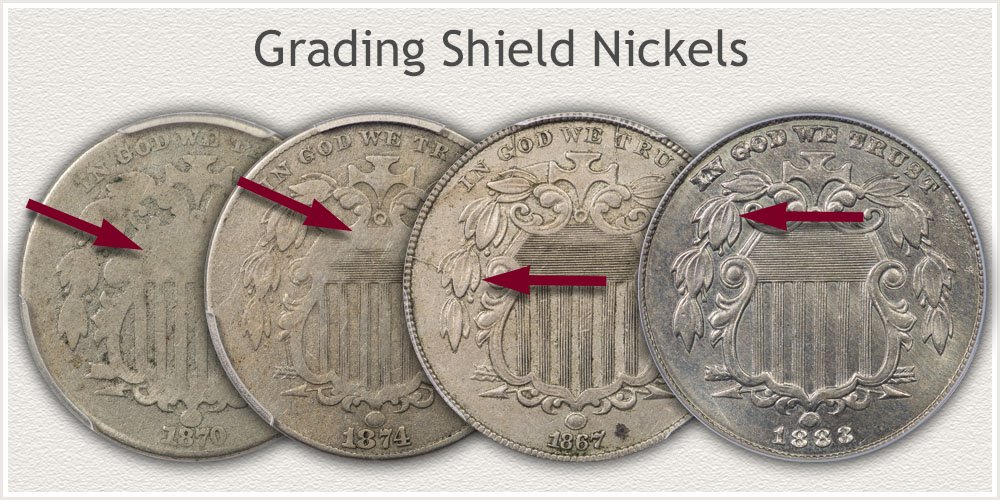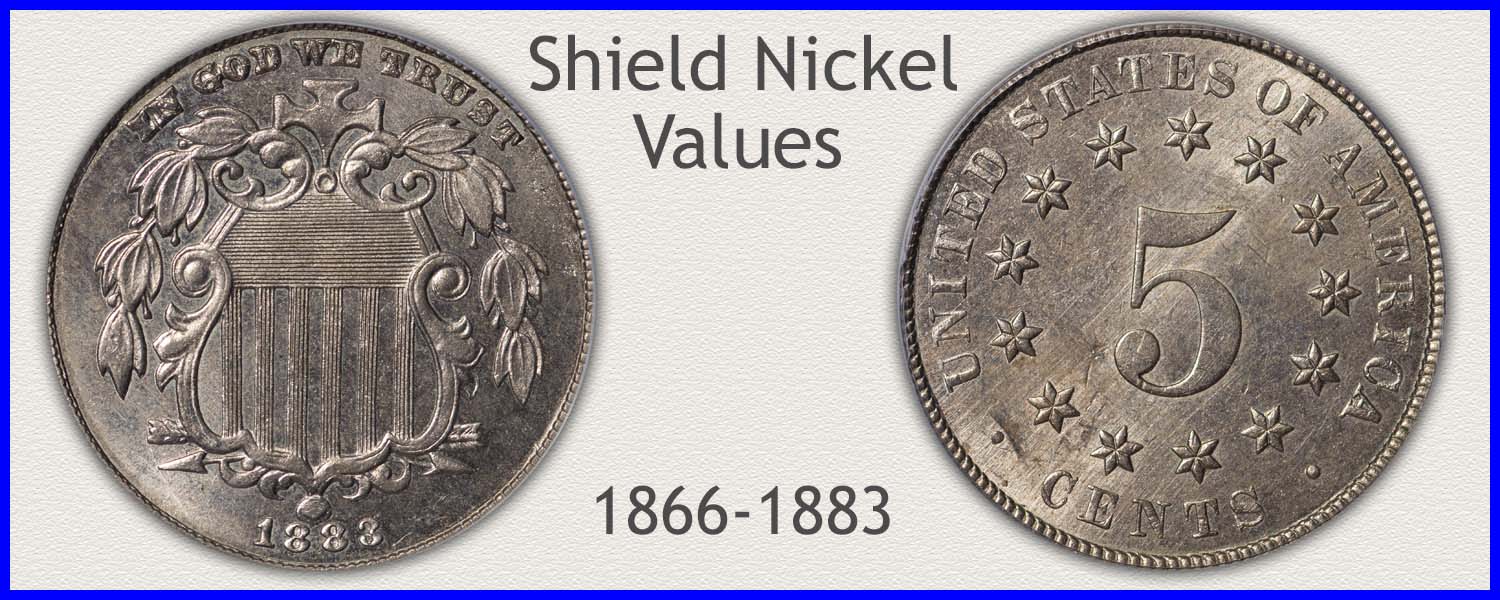Coin Values Moving with Precious Metals: Up-Dated 1/26/2026: Gold $5072 | Silver $107.48
Visual Grading Metrics
Shield Nickel Fine Grade
Fine grade Shield nickels are in the general classification of coins showing a moderate amount of wear. Many areas of the surface are well detailed offset by visible wear on high points of the design. Identify the condition of your coin when using visual grading metrics of a Shield Nickel in Fine grade
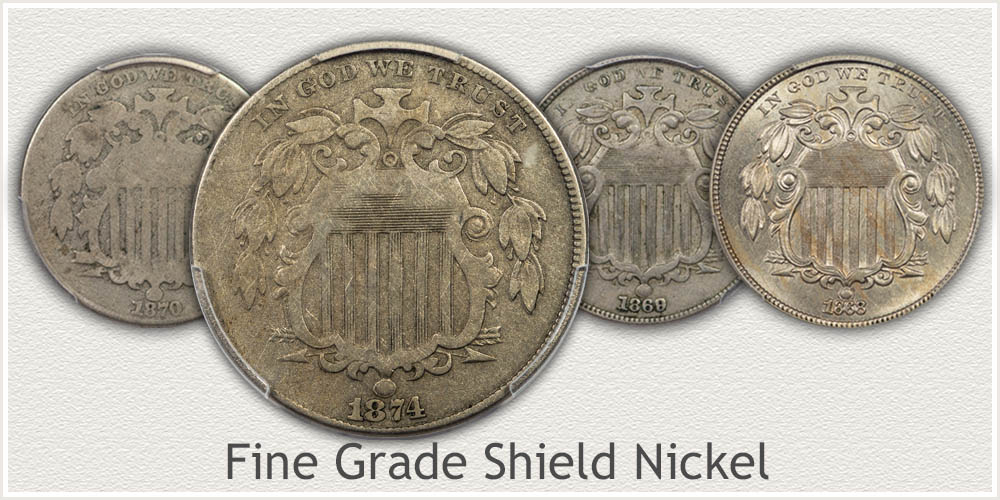 (fig. 1F) Verify a Close Match to the Fine Condition Shield Nickel
(fig. 1F) Verify a Close Match to the Fine Condition Shield Nickel
Examine the image (fig. 1F) of Shield nickels ranging in condition. Compared to the Fine grade example, a coin matching closely is within range to grade at this level.
Visual Grading Metrics Identify Shield Nickels in Fine Grade
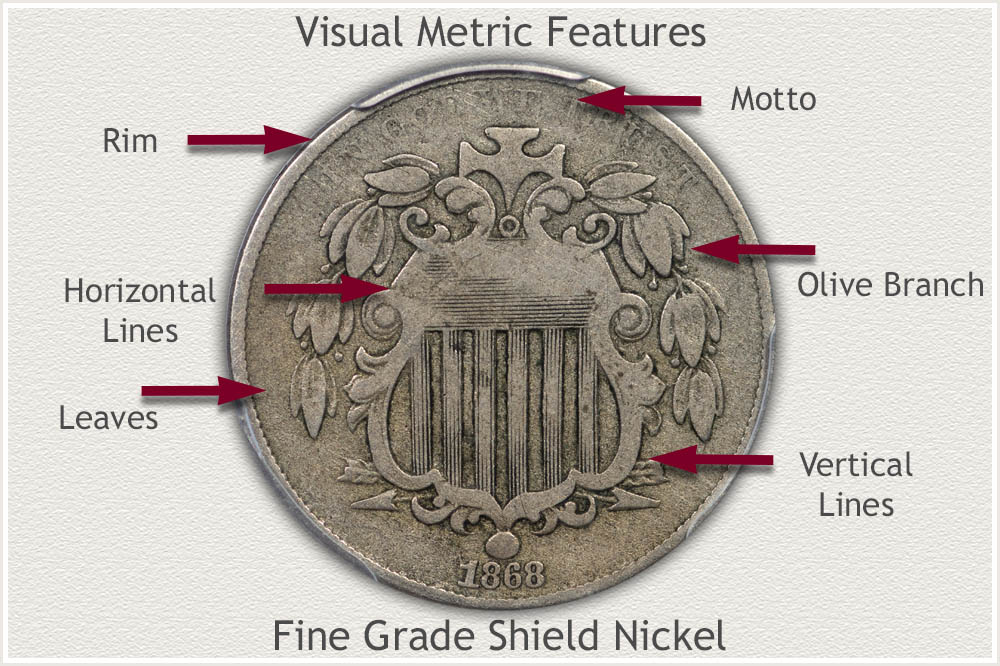 (fig. 2F) Visible Features Used to Determine a Fine Grade Shield Nickel
(fig. 2F) Visible Features Used to Determine a Fine Grade Shield Nickel
Examining specific areas of the design begins to rate a coin's condition. Using a series of visible metrics applied to the remaining design narrows a quality range. These ratings define condition. As example; coins considered Fine grade require the motto exhibit clear lettering. The individual metrics are each scored, with the combined score becoming a strong indication of the coin's grade.
Reference the above image (fig. 2F). Highlighted on the coin are important design elements providing recognizable wear patterns. These different levels of visible detail, when judged and rated, perform the visual metrics examination. The ratings from different areas of the coin are then scored. A positive score indicates a feature within the grade range.
Main Focal Points Used When Inspecting Surface Condition
- Rim: A strong indication of Minimum Grade Level
- Motto: Examine the Clarity of Letters
- Olive Branch Leaf Detail - Top Leaf Edges: Refines the Quality
- Olive Branch Leaf Detail | Top Leaf Central Detail: Further Defines Quality
- Horizontal Lines: Clarity Indicates Wear Levels
- Vertical Lines: Adds Confirming Visual Metrics
Positive scoring of these visual metrics defines a coin as a strong possibility for the Fine grade.
Research Data Provided by 20 Study Coins
20 professionally graded Shield nickels when examined provided a baseline when determining condition. These Fine grade nickels support the visual metrics in the rating and scoring data.
🔎Tools Useful When Grading Fine Condition Shield Nickels A clear view of a coin's surface quality becomes important at this condition level. Detecting small, faded areas of the design often becomes a deciding factor. Because wear reduces the height of features, the shadows cast from these are less distinct. A single light source concentrates light, creating a stronger shadow. This added contrast highlights a faint metric. Adding magnification (5x to 7x power) of the elements also detects these faint metrics.
Rim: Visual Grading Metrics Earning a Positive Score
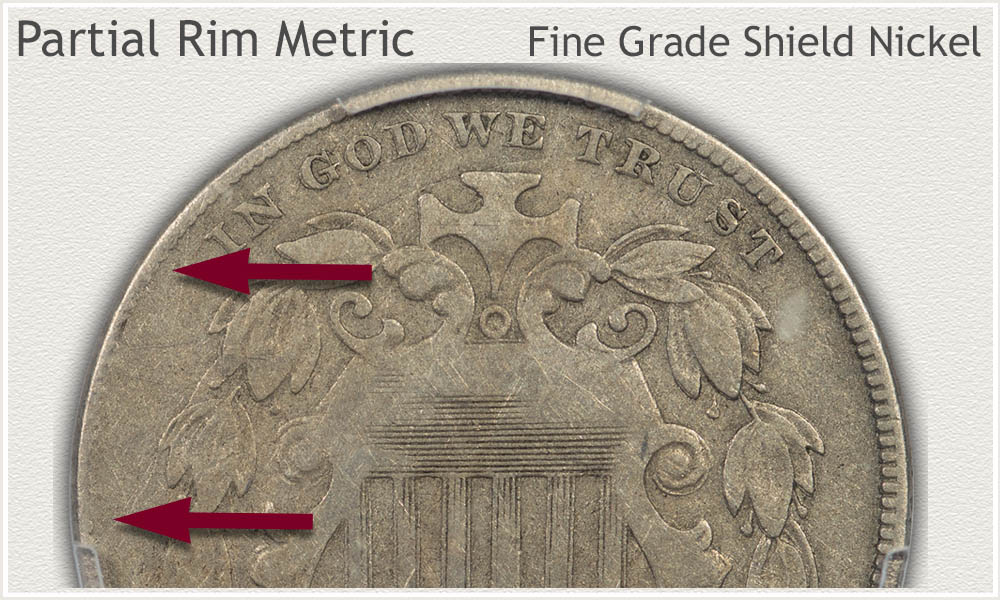 (fig. 3F) Illustration of a Partial Rim Metric Within the Fine Grade Range
(fig. 3F) Illustration of a Partial Rim Metric Within the Fine Grade Range
At the outer perimeter, the edge of the coin provides a visual metric indicating overall condition. In Fine grade, a raised edge remains protecting design elements. The motto, date, and leaves of the olive branches wear at slower rates because of the high relief rim. Locate the inner edge of the rim by the fine line showing where the rim meets the field of the coin. Areas missing this line are worn to the level of the field, losing part of the edge detail.
Notice within the example illustration (fig. 3F) the inner edge line fades into the field. The lower arrow points to this faded area. Continue along, and the inner edge becomes visible again. At the point of the upper arrow. This is a typical wear pattern of the rim. Rating the length of missing detail provides a visual metric helping determine if it meets the grade standard.
Three rating metrics quantify the remaining edge detail of Shield nickels with moderate wear.
Visual Rating Definitions | Rim Inner Edge Detail
Full Rim: Complete inner edge line runs continuous along the entire rim.
Partial Break: Small area of missing inner line, less than the length of the Motto.
Major Break: Missing inner line detail longer when compared to the length of the Motto.
Examine closely the rim of the coin and choose the metric that applies.
Rating: Rim Detail Remaining
|
Full Rim |
Partial Break |
Major Break |
This inner edge of the rim is the first indication of the amount of wear received by these Shield nickels. Visible detail remaining begins to separate above average condition examples. A Full Rim or Partial Break Rates a Positive Score.
Scoring: Rim Detail Remaining
|
|
Positive Score |
A Full Rim or Partial Break
Research Data Results: Rim Visual Metrics Rating a Positive Score
Study Group of 20 Fine Grade Shield Nickels
Inspecting the Rim of the example study nickels found the following useful results.
65% | Remained with a Full Rim
35% | Showed only a Partial Break to the Rim
0% | Displayed a Major Break along the Rim
Conclusion/Key Points: A significant observation shows 0% of nickels graded as Fine condition rated in the Major Break category. Once the rim is missing a length greater than Partial Break the coin falls below the Fine grade level.
High value qualities of a Partial Break rim or better, visually separate the condition of moderately worn nickels. Shield Nickels with no more than a partial break along the rim rated a Positive score.
Motto: Visual Metrics of IN GOD WE TRUST
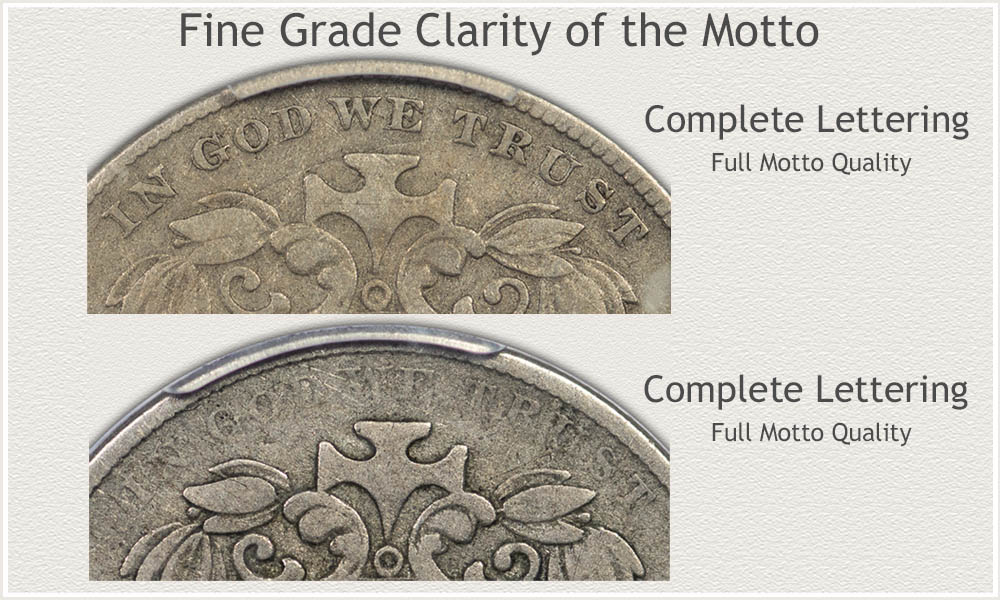 (fig. 4F) Examples of the Motto's Complete Lettering Metric Meeting Fine Grade Quality
(fig. 4F) Examples of the Motto's Complete Lettering Metric Meeting Fine Grade Quality
Clarity of the Motto is an important grading feature of Shield nickels. Located above the shield, IN GOD WE TRUST displays a range of clarity within the Fine condition. Some mottos are bold in appearance. Other coins display a motto with somewhat faded lettering. Readability of the letters becomes the visual metric. Reference (fig. 4F) illustrating these different clarities of the motto. Importantly, both remain acceptable at the Fine grade level.
Among the study group of 20 nickels, most have a well-defined Motto, easily readable. On a small number, the Motto is less clear, with a closer look required. Examine and rate the Motto using the following metrics:
Visual Rating Definitions | Lettering of the Motto
Full Motto: All Lettering Complete | This Includes Letters Faint but with Visible Outlines
Partial Motto: Any of the Letters are Incomplete with Missing Outlines
Inspecting and rating the Motto refines the level of detail required on Shield nickels within the Fine grade range.
Rating: Motto Completeness
|
Full Motto |
Partial Motto |
Often magnification helps confirm clarity of lettering. Check the box when All Letters are Completely Outlined Rating a Positive Score.
Scoring: Motto Completeness
|
|
Positive Score |
Full Motto
Research Data Results: Visual Metrics of the Motto
Study Group of 20 Fine Grade Shield Nickels
Using the metrics of Full and Partial visibility of the Motto, the study group of 20 coins recorded these percentage results.
95% | Full: A readable motto with complete outlines of the letters.
5% | Partial: A few letters missing definition and parts of their outlines
Conclusion/Key Points: Apply these qualities and scoring to coins in moderate wear condition. Visibility of the Motto rated as "Full" quickly confirms a coin's potential to qualify at the Fine grade level.
Olive Branch Visual Metrics
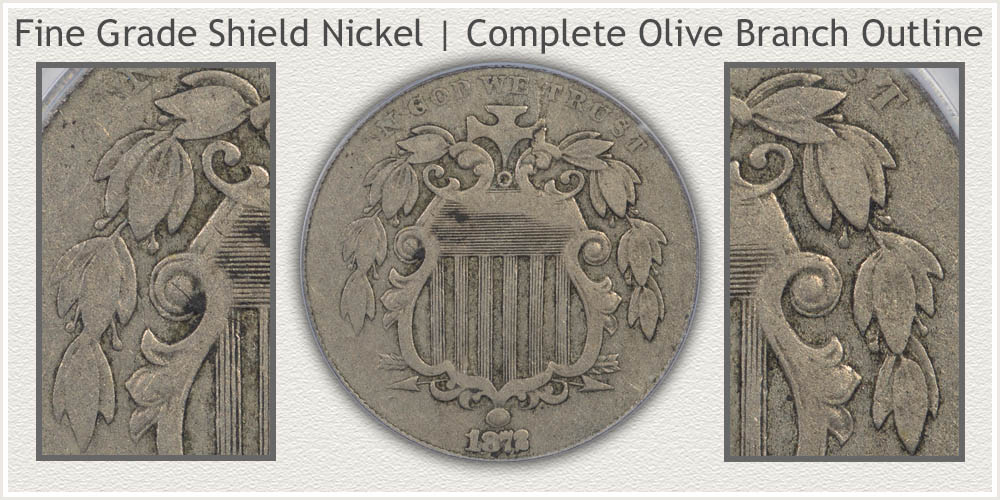 (fig. 5F) Confirm Each Olive Brance Displays a Complete Outline
(fig. 5F) Confirm Each Olive Brance Displays a Complete Outline
Recognizable Olive Branch detail is one of the first impressions of Shield nickels with moderate wear. Each olive branch displays ample detail at the moderate wear category. Smaller design elements show bold lines. Additionally, many features within the leaves remain. Two branches of olive leaves are either side of the frame. Four leaf groups with a top "overlay" leaf provide the finer detail when inspecting each branch.
Start by confirming all outer leaf edges of the entire olive branch meeting the field remain complete. Reference image (fig. 5F). Scan along the leaf edges adjacent to the rim for no blending of edges into the field. Consider the "Complete Outline Metric" as both a qualifier and disqualifier. All examples in the study group, 100% showed full, complete outlines of the olive branches. A coin without a complete outline was not rated at the Fine grade. These "incomplete outline" coins grade at a lower level.
When meeting the Complete Outline Metric, continue with rating the visible quality of the leaves.
Grading the Top Overlay Leaf Edge Visibility
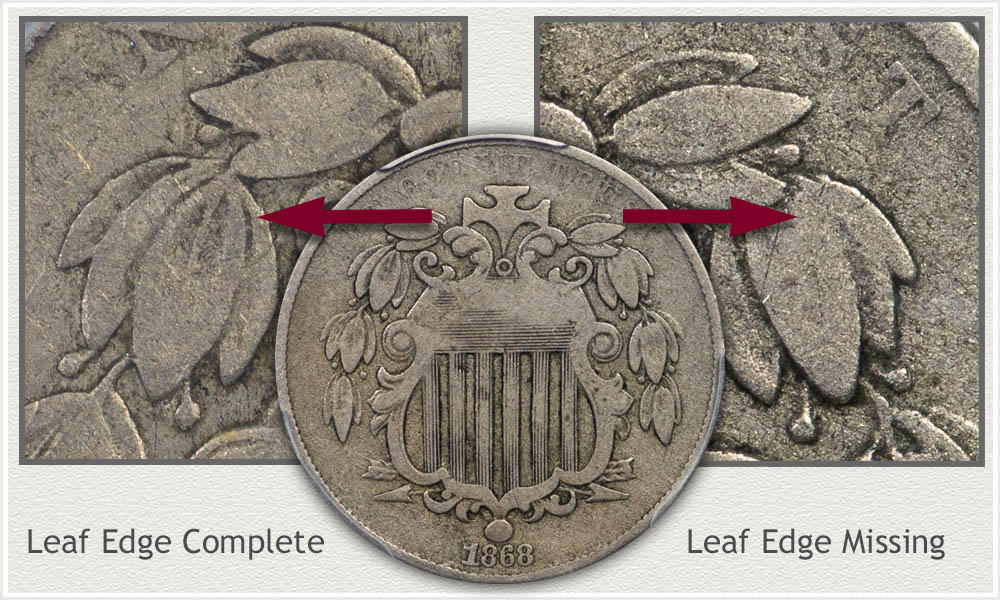 (fig. 6F) Compare the Detail of the Top Leaf Edge Visual Metrics
(fig. 6F) Compare the Detail of the Top Leaf Edge Visual Metrics
Notice the olive branch design contains leaves in distinct groups. Highest in relief within the eight leaf groups is a single top leaf. A total of eight top leaves receive the greatest amount of initial wear. Judging their condition measures, and begins to classify the moderate wear level.
Concentrate the examine on completeness of the defining edge of each top leaf. A Full Edge Top Leaf has a complete outline to its edges, on both sides of the leaf. Referring to the image, (fig. 6F), notice these edges show a range of boldness. A complete defining edge becomes the visual metric rating. Top leaves with a recognizable edge define the metric.
Visual Rating Definitions | Top Leaf Edge Detail
Full Edge: A complete outline visible on the top overlay leaf edge.
Missing Edge: Parts of the outer leaf edge are merged and incomplete.
Count and record the number of top leaves meeting the Full Edge Top Leaf rating.
Rating: Top Leaf Edge Detail
|
7 to 8 Top Leaves Full Edges |
5 to 6 Top Leaves Full Edges |
4 or Less Top Leaves Full Edges |
Scoring the completeness of top leaves is an important indication of condition. 5 or More Top Leaves with Full Edges Rates a Positive Score and meets the Fine Grade Level.
Scoring: Top Leaf Edge Detail
|
|
Positive Score |
5 or More Top Leaves Full Edges
Research Data Results: Top Leaf Edge Detail
Study Group of 20 Fine Grade Shield Nickels
Within the group of coins graded Fine, counting the leaves meeting the Full Edge metric provided the following percentage results.
50% | Remained with all 8 Top Leaves with Full Edges
10% | 7 Top Leaves with Full Edges
20% | 6 Top Leaves with Full Edges
20% | 5 Top Leaves with Full Edges
0% | Less Than 4 Top Leaves with Full Edges
Conclusion/Key Points: Rating the complete Top Leaf Edge demonstrates the moderate wear level. All Shield nickels in Fine grade show at least five of the top leaves with full outlines. A coin with complete edges on five or more top leaves is a strong qualifier for the grade. A coin rating 7 to 8 Top Leaves with a complete outline indicates a very nice quality Shield nickel. Strong for the grade level.
Grading the Top Overlay Leaf Center Detail
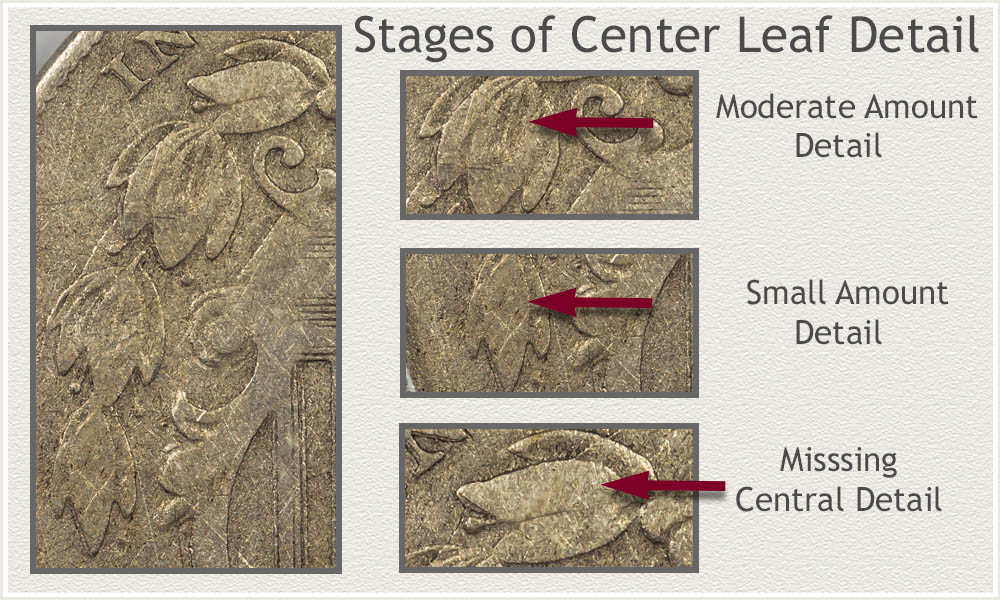 (fig. 7F) Typical Wear Pattern of Top Leaf Detail at the Fine Grade Level
(fig. 7F) Typical Wear Pattern of Top Leaf Detail at the Fine Grade Level
Measuring the interior detail of the top leaves refines the grade quality of a Shield nickel. In Fine grade, moderate wear covers the surface. When first minted, Shield nickels display many small features within the top leaves. Specifically, top leaves feature a low center relief, raised edges, and a raised vein as its primary design elements. Typically, wear at this grade level smooths the leaf, leaving half or less center detail.
Rating the condition of the top leaves gauges the remaining detail of a leaf's center contour and raised vein. Refer to the above image (fig. 7F), illustrating the acceptable grade range. Compare to the below grade range imaged. Examine closely each of the eight top leaves on a coin. Use the following metrics as a guide when judging condition.
Visual Rating Definitions | Fine Grade Top Leaf Detail
Visible Detail: A small to moderate amount of central detail within the top leaf remains with a low contour and central vein remaining.
Missing Detail: Central detail of the top leaf is missing. Smoothness covers the surface.
Rate and count the number of top leaves meeting the "Visible Detail" metric. Total high count is 8.
Rating: Top Leaf Center Detail
|
6 to 8 Top Leaves Central Detail |
4 to 5 Top Leaves Central Detail |
3 Top Leaves or Less Central Detail |
Identifying central detail within the eight top leaves requires close inspection and subtle grading metrics. Importantly, these small features become deciding factors at the Fine grade level. 4 or More Top Leaves with Visible Detail Rates a Positive Score.
Scoring: Top Leaf Center Detail
|
|
Positive Score |
4 or More Top Leaves with Central Detail
Research Data Results: Top Leaf Center Detail
Study Group of 20 Fine Grade Shield Nickels
These rating metrics applied to the group of study coins in Fine grade showed the following percentage results: With eight total top leaves, the highest possible score for a coin is eight.
Overall Rating Results: Percentage of Coins with Visible Top Leaf Detail
0% | Of the nickels showed all 8 Top Leaves with Central Detail
0% | 7 Top Leaves with Detail
15% | 6 Top Leaves with Detail
40% | 5 Top Leaves with Detail
30% | 4 Top Leaves with Detail
15% | 3 Top Leaves with Detail
0% | 2 Leaves or Less Top Leaves with Detail
Conclusion/ Key Points: Of note, because these coins are moderately worn as a first metric, none have a total score above 6 leaves with center detail. Also indicating the Fine grade wear level, any coin with less than 2 or fewer leaves with central detail fell below grade standards.
The strongest indicator of the Fine grade level requires 4 or more leaves with central detail. A full 85% of coins with center leaf detail showing on 4 or more leaves graded Fine.
Shield Horizontal Lines: Visibility Metrics
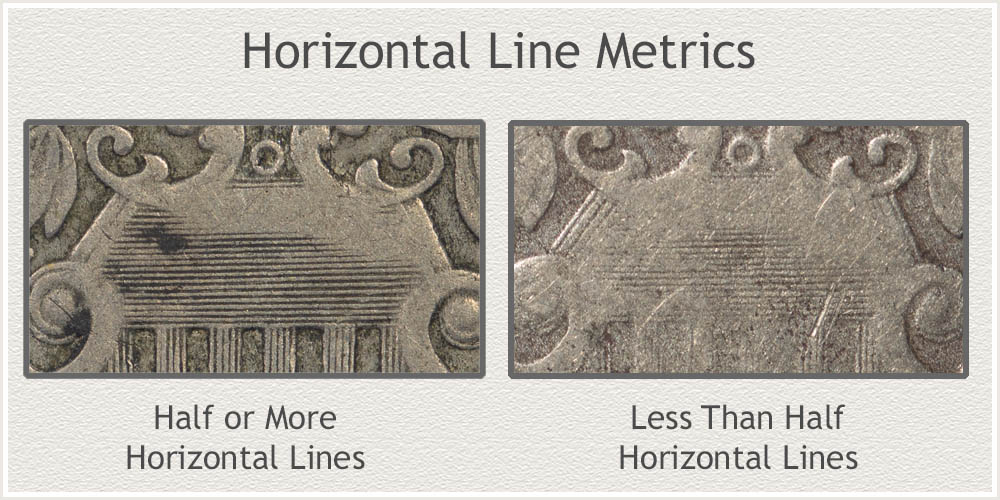 (fig. 8F) Compare to the Half or More Metric Identifying the Fine Grade Standard
(fig. 8F) Compare to the Half or More Metric Identifying the Fine Grade Standard
An excellent metric gauging levels of wear is the horizontal lines within the shield. This fine line detail is centrally located and set high in relief. A typical Shield nickel in the Fine grade range shows at least some of the lines visible. Visually judging the total amount of lines becomes the useful metric.
Examine the very central area of the shield. Thin lines running horizontally represent the "Blue Field" area of the Great Seal. These lines are separated by deep recesses. Because the raised lines are delicate, they visually represent wear that removes metal. Blending and missing lines records wear as smooth areas.
A useful technique when judging these lines is dividing the area into fourths. Top to bottom from the round feature just below the cross. Next, side to side along the upper edge of the spiral feature on the sides. Using these areas, judge the accumulative amount of remaining line detail.
Notice in the illustration (fig. 8F) how stages of horizontal line wear develop. The following metrics categorize these varying amounts of visible line wear.
Visual Rating Definitions | Horizontal Lines
Full: All Lines Visible with No Smooth Areas. Few coins grade in Fine condition when they display all horizontal lines complete. This typically signifies the coin is a possible higher-grade nickel.
Half: A Total of Half the Area Show Lines. Often the lines extend edge to edge. This is a good indication of Fine grade nickels. Consider this metric as an accumulative amount of line detail. Separate areas of visible lines, when combined, represent approximately half the total horizontal line area.
Few: Less Than Half the Area with Visible Lines. A few lines visible representing approximately a fourth of the total area meet the requirement.
None: A Smooth Area with No Lines Visible. A Shield nickel without any horizontal lines typically indicates a lower grade condition.
Rate and record the condition of horizontal lines using the visual metric definitions.
Rating: Horizontal Lines Visibility
|
Full |
Half |
Few |
None |
An improved level of clear horizontal lines shows a moderate level of wear to the surface. Evaluate this area to confirm ample detail. Half Amount of Visible Horizontal Lines or More Rates a Positive Score.
Scoring: Horizontal Lines Visibility
|
|
Positive Score |
Half or More
Research Data Results: Horizontal Line Visibility
Study Group of 20 Fine Grade Shield Nickels
An examination of the study nickels recorded the rating of visible horizontal lines. The results are the percentage of coins meeting the different metrics.
- 0 % | Displayed all Horizontal Lines
- 80% | Half the Amount of Lines
- 20% | Few Lines
- 0% | None of the nickels were without Lines
Conclusion/ Key Points: Horizontal lines within the shield are a strong measure of a nickel in moderate wear condition. Full lines visible are coins typically in a higher grade. Similarly, without any horizontal lines, the coin's condition is below the Fine grade.
A standout percentage is the 80% of example coins with the Half Amount Visible. This becomes the metric to achieve for coins in Fine grade. The 20% of coins with the "Few" Lines Visible rating are at the lower end of the scale. However, they have the potential to grade in Fine condition.
Shield Vertical Lines: Visibility Metrics
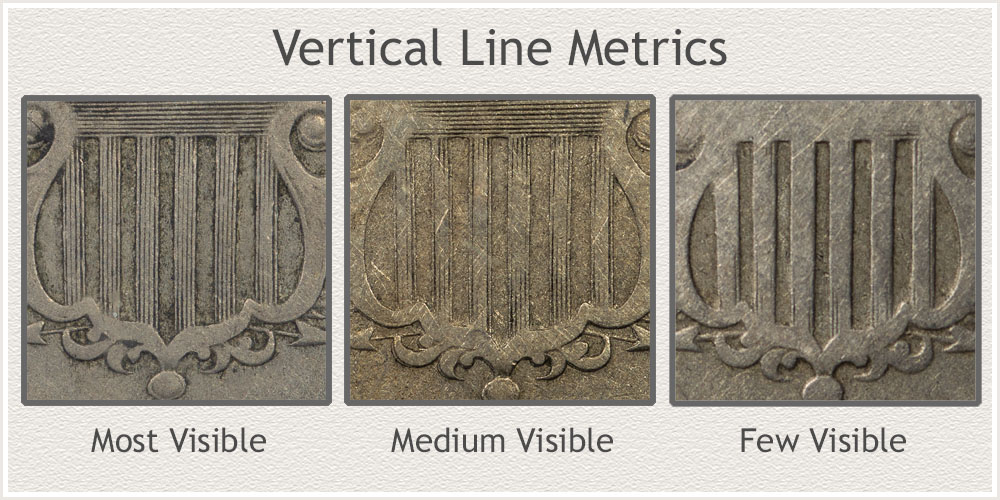 (fig. 9F) Three Vertical Line Conditions Illustrating Metrics Used on Shield Nickels
(fig. 9F) Three Vertical Line Conditions Illustrating Metrics Used on Shield Nickels
Vertical lines within the shield add a confirming metric indicating a coin's condition. A large area of the shield contains vertical stripes, a key focal point of the design. Seven low relief areas represent the "White Stripes" of the Great Seal. Six raised bars with fine lines represent the "Red Stripes." Thin recesses on the upper surface of the raised bar create these fine lines. Areas of smoothness are the result of moderate wear. The visible amount of the fine vertical lines on the raised bars provides the condition metric. Illustrated (fig. 9F) are different stages of vertical line visibility representing nickels with moderate wear.
Visual Rating Definitions | Vertical Line Condition
Most Lines Visible: One or two bars show small areas of merged lines. These lines are often faded; however, only small areas are merged on a maximum of two bars. This coin displays a clear level of detail.
Medium Amount Visible: Three or more raised bars with some merging of lines. Additionally, many lines are faded. Typically wear removes lines in small areas towards the center of the bars.
Few Visible Lines: Wide spread flatness and missing lines cover the surface of most raised bars. Only a small amount of visible lines remain. A coin with any bar completely missing lines over half its length fits into this category.
Rate the quality and visibility of vertical lines, noting their condition by the following metrics.
Rating: Vertical Line Condition
|
Most Visible |
Medium Amount Visible |
Few Lines Visible |
With the inspection and rating of the vertical line condition complete. Scoring the results narrows a grade range. Medium to Most Fine Lines Visible Rates a Positive Score helping identify the Fine Grade.
Scoring: Vertical Line Condition
|
|
Positive Score |
Medium to Most Lines Visible
Supporting these scoring requirements are the metrics observed on example nickels professionally graded in Fine condition.
Research Data Results: Vertical Lines Within the Shield
Study Group of 20 Fine Grade Shield Nickels
Applying the visual metrics to vertical lines, each of the 20 nickels in the study group received a rating. The percentage of coins meeting each metric helps identify a moderately worn, Fine grade Shield nickel.
Results: Vertical Lines | Visual Metrics Fine Grade:
- 30% | Of the nickels displayed Most Lines Visible
- 60% | Medium Amount Visible
- 10% | Few Lines Visible
Conclusion/ Key Points: Completing the examination of the study nickels showed a range of line visibility. Fading and blending of vertical lines was evident on all coins. The small, 10% of coins rating at Few Lines Visible indicates a certain level of higher detail required. Fine grade condition favors examples with the eye appeal of additional line detail.
The largest number of coins, 60% in the Medium Amount Visible category, sets a clear standard. At the high end of rating; 30% of the study coins rated Most Lines Visible. This suggests a high rating helped with the coin's overall condition.
Aesthetic qualities of fine detail become a factor when judging the Fine grade condition. With 90% of coins in this grade showing ample vertical lines.
Final Visual Metric Scoring | Fine Grade Shield Nickel
A thorough examine of the coin's condition from its outer rim to central devices provided many grading metrics. Pulling all this together with a final score judges the overall quality and grade level of a Shield nickel. These coins are noted as having only moderate wear. This improvement in condition increases both collector interest and Shield Nickel Value.
A Final Score of 5 or More Positive Metrics indicates a Shield Nickel within the Fine Grade level.
Final Scoring: Visual Metrics Fine Grade Shield Nickel
5 or More Positive Metrics
Rates a Positive Final Score
|
Positive Score |
Design Device |
Visual Grade Metric |
|
|
Rim |
Full or Partial Break Rim |
|
|
Motto Completeness |
Full Motto |
|
|
Top Leaf Edge Detail |
5 or More Top Leaves Full Edges |
|
|
Top Leaf Center Detail |
4 or More Top Leaves with Central Detail |
|
|
Horizontal Lines Visibility |
Half or More |
|
|
Vertical Line Condition |
Medium to Most Lines Visible |
Research Data Results: Final Scoring Fine Grade Shield Nickel
Study Group of 20 Fine Grade Shield Nickels
Following are the percentage results of the Fine grade nickels and their final scoring.
65% | Scored 6 Positive Metrics
20% | Scored 5 Positive Metrics
15% | Scored 4 Positive Metrics
0% | Scored 3 or Less Positive Metrics
Conclusion/Key Points: With moderate detail remaining, all nickels scored well across all metrics. Their final scoring does reveal a strong break point at the 5-point positive score. Of importance, a high number, 85% of the nickels scored 5 plus in the final total. This becomes an important score to reach. Use the Final Score of 5 or More to confidently judge a Shield nickel in Fine Grade condition.
Secondly, any nickel within the 4 Positive Score needs an additional evaluation. Small details within the leaves and fine lines of the shield are important deciding metrics. Finally, consider those scoring 3 or fewer as slightly less preserved than the Fine grade.
References
U.S. Mint. Symbols on Our Coins
https://www.usmint.gov/learn/history/us-circulating-coins
Department of State The Great Seal of the United States July 2003
U.S. Mint. Catalogue of Coins of the United States
https://nnp.wustl.edu/library/book/554591
Coin Values | CoinStudy Articles
Shield Nickel | Visual Grading Metrics Series
Visual Grading Metrics: Shield Nickels Good Grade
Visual Grading Metrics: Shield Nickels Extremely Fine Grade
Visual Grading Metrics: Shield Nickels Mint State Grade
Grading Shield Nickels | Starting Guide
Becoming familiar and recognizing the overall condition of a Shield nickel starts the grading process.
How to Grade Shield Nickels | Visual Guide
Value differences of Shield nickels from one grade to the next requires an in-depth study of the coin's condition. Using a conservative approach when grading, others will agree, locking in an accurate value.
Shield Nickel Value | Condition and Grade Determine Worth
Grading a coin's condition completes a needed step. Following the step-by-step process then references value charts. Each Shield nickel value on the chart shows a basic scarcity of the series. Dates identify these coins.
★Coin Values Discovery... finds Old Nickel Values and...
All old US coin values. Review the coin index with images, helping identify each series. Value charts, grading images, and descriptions uncover how much your box of old coins is worth. Begin the step-by-step value process for each coin series.
